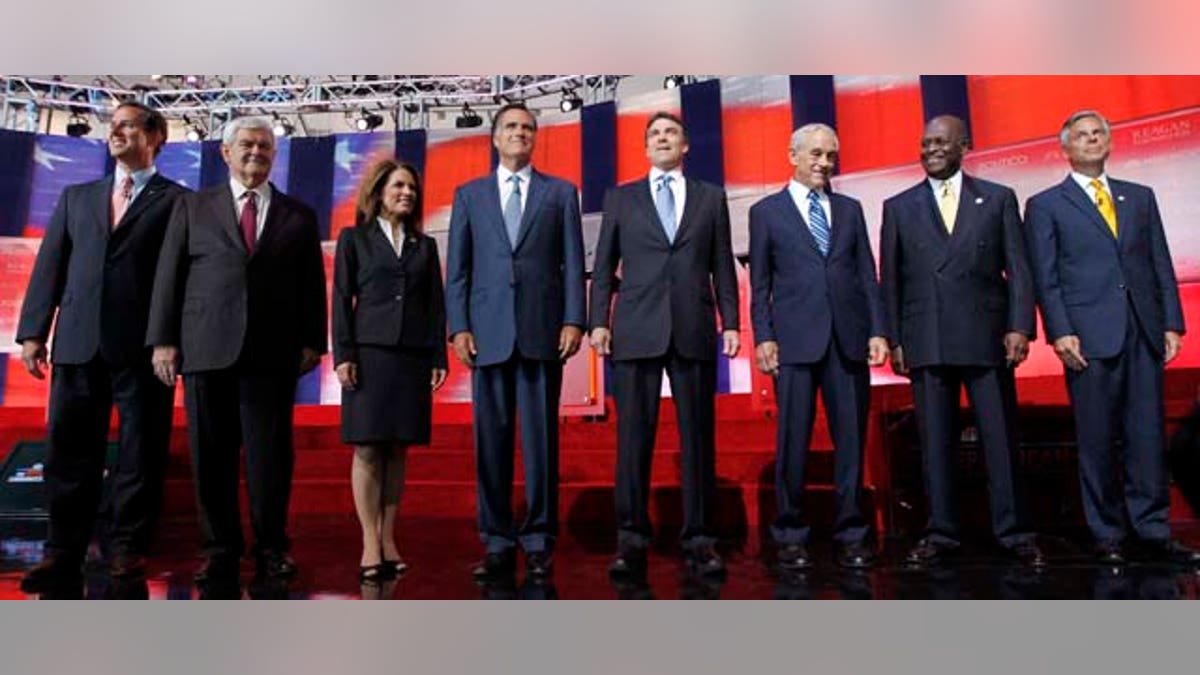
FILE - In this Sept. 7, 2011, file photo Republican presidential candidates stand together before a Republican presidential candidate debate at the Reagan Library in Simi Valley, Calif. They will debate again on Sept. 22, 2011, in Orlando. (AP Photo/Chris Carlson, File) (AP2011)
It’s the economy – and immigration – stupid!
Those are the issues political analysts say the Republican presidential candidates participating in the upcoming Republican debate have to address to strike a chord with Latinos.
“Latinos are listening,” said Alfonso Aguilar, executive director for Latino Partnerships for Conservative Principles.
The nine candidates will take the floor Thursday night to try to convince the nation why voters should choose them to represent the GOP against President Barack Obama next year.
Aguilar said that courtship has to include wooing Latinos – and it has to have begun already. Republican candidates in the past, he said, have relied on the strategy of ignoring Hispanic voters during the primaries, only to try to scramble to get in their good graces come general election time.
That tactic is flawed, Aguilar said.
“If you want to win, and go beyond the threshold of 40 percent, you have to be aware that you’re talking to Latino voters,” he said. “If that’s not your strategy, you’re not going to win.”
Latinos voted overwhelmingly for then-Senator Obama in 2008. He secured 67 percent of the Hispanic vote, according to exit polls, while Arizona Senator John McCain managed only 31 percent of the vote.
But there have been signs of discontent among Latinos with the president lately. His approval rating has dipped amid a stubborn economy – unemployment for Latinos rate has hovered around 12 percent – and deportations have increased since he took office.
“Hispanics have been kind of disappointed with Obama,” said Bettina Inclán, a Republican strategist and consultant. “And they’re trying to see what options they have to move this country forward.”
Advancing the Latino agenda, however, means very different things to different Hispanics. When asked their political views by pollsters for a Pew Hispanic Center national survey of Latinos, 32 percent of the respondents said they were either very conservative or conservative, while 26 percent responded that they were very liberal or liberal.
Thirty-one percent said they considered themselves moderate, eight percent said they didn’t know, and two percent refused to respond, the study, conducted last year, found. It had a margin of error of +/- 3 percent.
The GOP candidates, meanwhile, have to navigate that uneven spectrum of political beliefs to see where they fit in. To connect with the Latino voter at the debate, analysts said, they will have talk jobs and expand the immigration narrative beyond enforcement.
“We need a solution to the immigration problem,” said Fernando Mateo, president of Hispanics Across America. “We need someone that’s going to hit this issue head on as soon as they enter the White House.”
Mateo and several business leaders met with Texas Governor Rick Perry Monday during his visit to New York City to discuss, among other things, immigration and small businesses.
“We were satisfied to the extent that he has done more than anyone,” Mateo said of Perry’s immigration policies in Texas.
Perry signed a law in 2001 that allows undocumented immigrants to attend college at in-state tuition rates and receive financial aid.
“Latinos will support any candidate that takes a stand,” Mateo added. “And we need to address this already.”
As debates go, however, the candidates may not have enough time to comprehensively lay out their plans to fix the nation’s broken immigration system, analysts said. The format, which provides a small allotment of time to answer questions, usually leaves only a minute or two to squeeze out a rhetorical sound bite, they said.
“Immigration is usually oversimplified, and voters get only a taste of the real issue,” said Inclán, the Republican strategist. “You’re not going to get to the nitty gritty.”
Thus, the discourse around swinging the Latino vote back to the Republican Party – George W. Bush received 44 percent of vote in the 2004 presidential election – needs to pivot toward non-immigration issues, analysts believe.
“Latinos have to be careful that we don’t become a one-issue community,” said Angelo Falcón,president and founder of the National Institute for Latino Policy.
Immigration, furthermore, has become too toxic an issue to really expect a shift during this political cycle, Falcón added.
“Immigration is dead on arrival,” he said. “[The Republicans’] focus is totally on the enforcement aspect. That’s it.”
Falcón, in fact, believes both Democrats and Republicans have dropped the ball on Latino issues. He added that Latino leaders need to be more aggressive in finding grassroots solutions to address its many problems.
“We need to go beyond the parties and look out for our communities,” he said.
In the meantime, the candidates will take the stage Thursday, and immigration – a third rail of sorts in American politics – will be up for debate. Aguilar, for one, says the presidential wannabes shouldn’t be shy about taking the conversation past the normal rhetoric.
“They shouldn’t be afraid to stand their ground and articulate ideas and solutions,” he said.
Wil Cruz can be reached at wil.cruz@foxnewslatino.com.
Follow us on twitter.com/foxnewslatino
Like us at facebook.com/foxnewslatino




